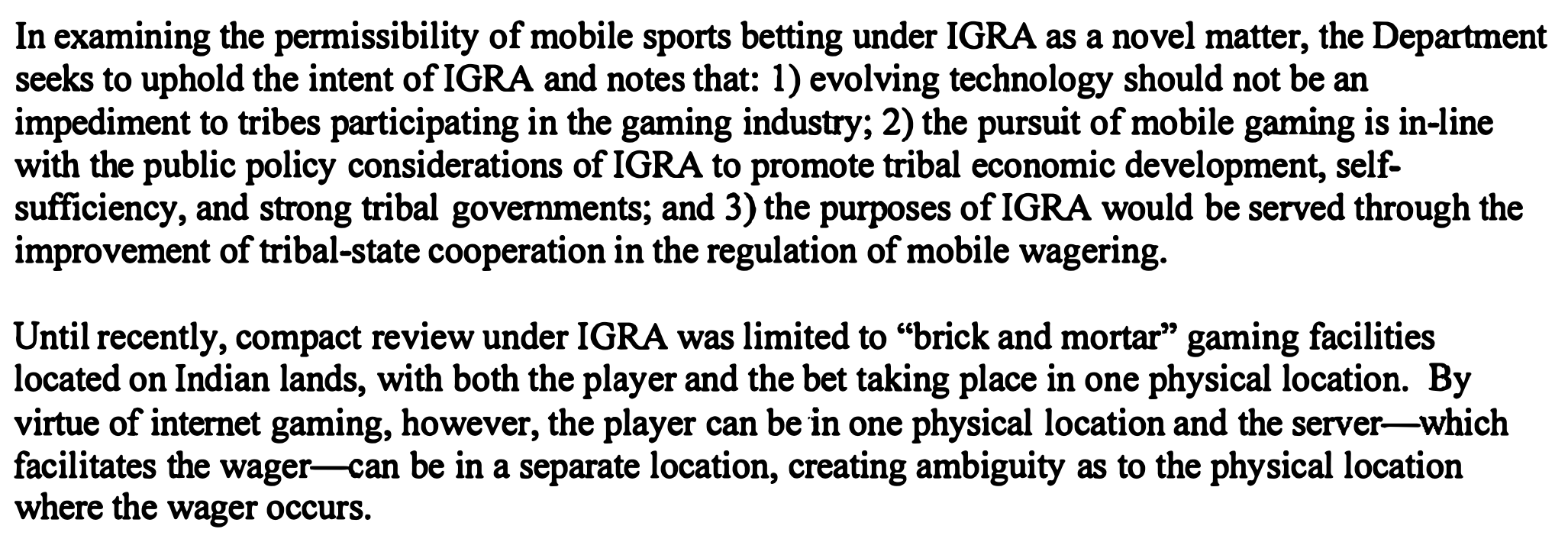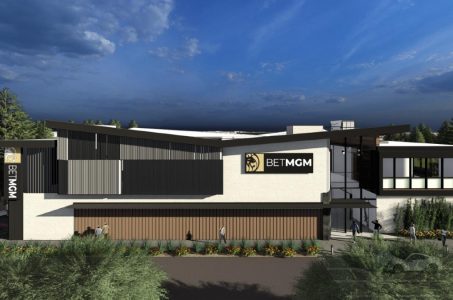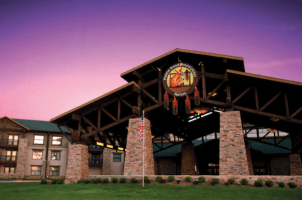Seminoles Get OK on Florida Sports Betting, But Pari-Mutuel Deal Concerns Feds
Posted on: August 7, 2021, 04:40h.
Last updated on: August 8, 2021, 11:10h.
The US Department of the Interior announced Friday that it took no action after reviewing the gaming compact that would give the Seminole Tribe of Florida exclusive rights sports betting rights. That includes mobile in the Sunshine State.
Based on federal law, that means the agreement is “considered” approved. But the agency added the approval only covers areas where “the compact is consistent” with the Indian Gaming Regulatory Act (IGRA).

Florida and Seminole leaders claimed victory after the Bureau of Indian Affairs (BIA) posted the letter from Principal Deputy Assistant Secretary of Indian Affairs Bryan Newland. He is the second-highest-ranking official in the Interior Department agency. However, as a federal lawsuit has already been filed in the case, the final decision on the matter will come in the courts.
As it stands now, sports betting is expected to launch in Florida in a couple of months. In exchange for getting approval from the state to offer sports betting on and off tribal lands — offering craps and roulette at casinos, and opening three more Hard Rock casinos in the state — the Seminoles will give the state at least $2.5 billion in revenue over the next five years.
By 2030, the state is expected to receive $6 billion. That amount will be reduced if the Seminoles lose exclusivity, which could happen if a voter referendum pushed by DraftKings and FanDuel passes next year.
This mutually beneficial agreement will grow our economy, expand tourism and recreation, and provide billions in new revenue to benefit Floridians,” Florida Gov. Ron DeSantis said in a statement.
Seminole Chairman Marcellus Osceola said Floridians will benefit beyond the payments, as “statewide sports betting and new casino games that will roll out this fall mean more jobs for Floridians and more money invested in this state.”
Is Interior Reconsidering Tribal Online Gaming?
The federal government received the compact on June 21, triggering a 45-day review process. In letters, Newland told DeSantis and Osceola that officials thoroughly reviewed it, but they ultimately chose not to take action. However, based on Newland’s comments, federal officials have some concerns about certain aspects of the agreement. But at the same time, they appear to signal a possible change in thought on what tribal operators can offer.
Regarding the latter point, here’s what Newland said in the letter:

Newland notes that courts have previously determined online gaming was not allowed under IGRA. But added previous cases focused on instances where the tribe sought to offer it without a compact with the state. In some cases, the state had banned the types of online games being pursued.
He added that in Florida, mobile sports betting is allowed by the compact and state law, with both stating the gaming action takes place on tribal lands because that’s where the server is located. A footnote in the letter indicates that when Congress passed IGRA in 1988, it “provided context for evolving technological changes.” But that provision was specifically in the legal definition of Class II gaming. Those “evolving technological changes” were not included in the definition for Class III gaming, which would include sports betting.
The parameters Newland describes are similar to the ones established in HR 4308, a bill filed by US Rep. Lou Correa (D-Calif.) last month that seeks to modernize IGRA and account for online gaming.
Lawsuit Filed Over Florida Sports Betting Deal
On July 2, two affiliated pari-mutuel operators in Florida filed a federal lawsuit in Tallahassee seeking to keep the state and Seminoles from enacting the off-reservation provisions of the tribal compact and related state law.
Besides offering online sports betting statewide and retail sportsbooks at the Seminole’s Hard Rock Casinos, the agreement also allows the Seminoles to offer sports betting kiosks at pari-mutuel facilities, such as racetracks and jai alai frontons. According to the compact, the Seminoles will give the state 13.75 percent of its net sports betting revenues if it enters into partnerships with at least three pari-mutuel operators. If the tribe does not reach that threshold, it will then give the state 15.75 percent.
West Flagler Associates, Ltd. and the Bonita-Fort Myers Corp. filed the suit. Both companies, which are owned by Southwest Florida Enterprises, say they would be shut out from offering sports betting if they do not enter into an agreement with the Seminoles. Since the compact and law give the Seminoles exclusivity, West Flagler, operator of Miami’s Magic City Casino, and Bonita-Fort Myers, operator of the Bonita Springs Poker Room, say they are being denied a chance for a level playing field.
Court documents filed Thursday indicate that DeSantis and Florida Department of Business and Professional Regulation Secretary Julie Brown were served with the complaint on July 27.
Feds Concerned About Seminole Kiosks at Pari-Mutuels
Newland in the letter listed the pari-mutuel marketing agreement as a concern, as well as the compact’s agreement to give the state jurisdiction over patron disputes and tort claims.
The compact calls for the Seminoles to negotiate contracts of at least five years in length with pari-mutuel operators within three months from when the compact takes effect. In return for housing the kiosks, the pari-mutuel operators would get 60 percent of the net win the machines generate, minus a “reasonable and proportionate” share of the Seminole’s expenses.
Newland said federal officials are concerned the contracts may need further review from the National Indian Gaming Commission. In addition, IGRA calls for the tribe to have “sole proprietary interest” in the gaming operation. But the contracts raise questions about that.
“Accordingly, the Department does not endorse the marketing agreement arrangement provided in the Compact,” Newland wrote.
The gaming compact will officially take effect once it’s posted in the Federal Register. Typically, that happens within a few business days. For example, the government notified the Catawba Indian Nation and the state of North Carolina that their Class III compact had been approved on March 19. It was posted in the Register on March 25.
Related News Articles
BetMGM Sportsbook at Arizona Cardinals NFL Stadium Begins Construction
Genius Sports, Sportradar Seen Benefiting from Florida Sports Betting
Most Popular
Mirage Las Vegas Demolition to Start Next Week, Atrium a Goner
Where All the Mirage Relics Will Go
Most Commented
-
Bally’s Facing Five Months of Daily Demolition for Chicago Casino
— June 18, 2024 — 12 Comments
















No comments yet